|
HINDUISM
Tamil cultural debate
Dharman Dharmaratnam
|
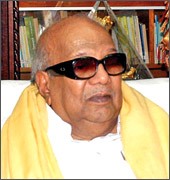
Karunanidhi
|
The Kanthamurukesanar Tamil cultural centre and certain patrons of
the Murugan Temple at Birchmont Road in Scarborough Toronto recently
backed efforts of the Karunanidhi administration in Tamil Nadu in 2008
to shift the date of the Tamil new year from April, as observed for
centuries, to January to coincide with the Indic harvest festival called
Thai Pongal in Tamil or Makara Sankranti. The political sub-text behind
the move is unnoticed in Sri Lanka where Tamils continue with the
traditional reckoning of time that begins with the month of Chitterai in
April. It is unlikely that many in the Sri Lankan Tamil community in
Toronto are even aware of the debate. This article is intended to
provide the Tamil literary evidence and recount the politics in Tamil
Nadu behind the move.
Tamil literary and historical evidence
|
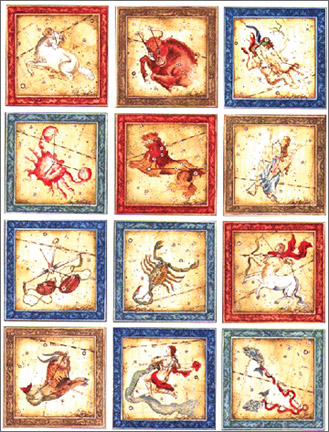
Tamil calender is based on the signs of the zodiac |
The Tamil calendar is based on the signs of the zodiac. The early
Tamil literary work, the Nedunalvaadai is dated to between the years 100
and 300 of the common-era (CE). This was the Sangam era that represented
the earliest outpourings of Tamil literature that survived the
centuries. The poet Nakkirar authored the Nedunalvaadai. Lines 160 to
162 of the poem describe the movement of the sun through the 12 signs of
the zodiac starting with Medam or Mesha. This is no other than the Tamil
month of Chitterai in April. Koodaloor Kilar, a contemporary of Nakkirar,
in the 229th Poem of the Puranaanooru also refers to the 12 signs of the
zodiac that begin with Medam in April.
- The Silappadikaram and Manimekalai are
Tamil epics
- Tamil Hindu tradition
influenced Cambodia,
Indonesia, Thailand, Burma, Laos
- Thai Pongal is not uniquely Tamil |
The dating of early Tamil literature is a source of much debate. The
Tolkaapiyam is the oldest surviving Tamil grammar. This is dated by
several to 400 CE. The Tolkaapiyam divides the year into six seasons
where Chitterai in April marks the start of the Ila-venil season or
summer. Thai in January conversely does not commence any season.
The Silappadikaram is a Tamil epic that is dated by some to 500 CE.
Canto 26 of the text once again refers to the 12 signs of the zodiac
with the sun commencing its journey through the heavens in the sign of
Medam in April. Canto five of the Silappadikaram describes the foremost
festival in the Chola country that was celebrated in Chitterai.
The Manimekalai, another classical epic in the Tamil language refers
to the Tamil solar calendar as we know it today. The early medieval
Urai-aasiriyar or commentator, Adiyaar-ku-nalaar mentions the 12 months
of the Tamil calendar with particular reference to Chitterai. I can
provide other similar references in Tamil literature. The weight of
Tamil literary evidence indicates the start of the calendar in Chitterai
or Medam in April. The only reference to the month of Thai in early
Tamil literature was to the fast of Thai Neer-aadal when young unmarried
women bathed and fasted in honour of the God Vishnu to secure a worthy
husband.
Tamil Hindu tradition influenced Cambodia, Indonesia, Thailand, Burma
and Laos between 400 CE and 1200 CE. This coincided with the adoption of
the Pallava grantha script, the centralization of royal authority and
the adoption of the Tamil new year in these countries. This explains the
celebration of the new year in mid-April in Burma, Cambodia, Thailand
and Laos. There are inscriptional references in Pagan, Burma to
Vaishnavite courtiers from the Chola country, known in Burmese as the
Sankran Bumnah, who were tasked with calculating the start of the new
year in mid-April. These inscriptions can be dated to circa 1000 CE.
|
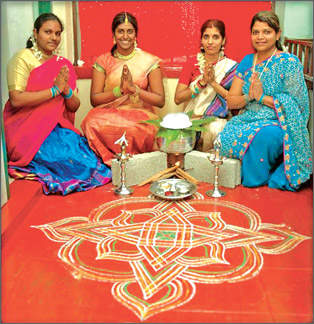
Thai Pongal is one of the significant celebrations of Hindus |
Similar inscriptions in Sukhothai, Thailand refer to South Indian
keepers of the calendar in the 14th century CE. The observance of the
traditional Tamil new year in April continued in the days of the 10th
century Chola empire as witnessed in Saivite Tamil texts and
inscriptions and in the days of the Jaffna Kingdom.
It was hallowed by tradition. Kandyan royalty intermarried with
aristocratic families from Thanjavur which led to the Nayakar dynasty
ruling the Kandyan kingdom from 1739 to 1815 CE. Robert Knox documents
the celebration of the April new year in the Kandyan kingdom during the
Dutch era. He had used the Julian calendar then prevalent in England and
therefore described the event in late March, April in today’s reckoning.
The 1920s: A Time of Ferment
Events in the 1920s provide the backdrop to Karunanidhi’s efforts in
2008 to shift the date of the Tamil new year. The Indian National
Congress (INC) was becoming a mass-based freedom movement in the 1920s.
It was making deep inroads into the Madras Presidency as witnessed in
the efforts of anti-colonial freedom fighters such as V O Chidambaram
Pillai, affectionately remembered as Kapal-otiya Tamizhan, Subrahmanya
Bharati and Subramanian Sivam.
The leadership of the INC in Madras however was Tamil Brahmin
dominated. The Vellalar or farmer caste and the Telugu Brahmin were
under-represented. The colonial authorities leveraged the
Vellalar-Chettiar-led Justice Party to counter the influence of the INC.
The Justice Party backed the continuation of British rule.
Maraimalai Adigal, a Saivite Vellalar, provided the religious
underpinnings of this movement. Amongst other things, he called for a
change in the date of the Tamil new year from Chitterai in April to Thai
Pongal in January in 1920s. He dismissed the April new year as a Brahmin
event while Pongal was then a pre-eminently Vellalar festival. His
suggestion was not accepted by the population at large.
It bears mention, however, that seven other Saivite Vellalar
activists including Navalar Somasundara Bharatiyar, K Subramaniapillai,
Kalyanasundera Mudaliyar and Sachidanandapillai supported his efforts.
Maraimalai Adigal claimed that Pongal was uniquely Tamil, an assertion
that was incorrect as demonstrated below.
Critics charge that the real motive was to align the Tamil calendar
with the English year that began in January. Regardless, the proposal
was forgotten for the next 80 years.
The Karunanidhi Era
Much later, in 2008 the Tamil Maiyam led by Father Jagath Gasper Raj
revived the call for a change in the date of the Tamil new year, a
suggestion accepted by Karunanidhi, the Chief Minister of Tamil Nadu.
While all political parties in Tamil Nadu initially supported the move,
the All India Anna Dravida Munnetra Kazhagam, led by Jayalalithaa and
the pro-LTTE Marumalarchi Dravida Munnetra Kazhagam, led by Vaiko,
quickly opposed Karunanidhi’s proposed change in the date of the new
year.
The Union Territory of Pondicherry did not accept the change either.
Popular sentiment ignored efforts of Karunanidhi to move the Tamil New
Year to January. A case was filed by a group purportedly including Dalit,
Thevar, Nadar, Vanniyar and Chettiar caste members, in the Madurai bench
of the Tamil Nadu high court challenging Karunanidhi on this count. The
High Court, after much delay, is likely to hear the case in April 2011.
|
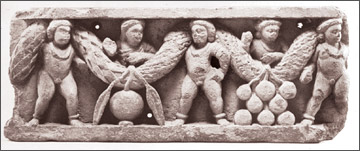
Manimekalai dancer with magic bawl |
Karunanidhi, in an effort to accommodate public opinion in Tamil Nadu,
conceded the celebration of the April new year with a new term called
Chithirai Tiru-naal, the holy day of Chithirai. The day remained a
public holiday in Tamil Nadu, albeit purportedly to commemorate the
birthday of the veteran Dalit leader Dr B R Ambedkar. All television
channels in Tamil Nadu telecast festive Chithirai Tiru-naal programs
while temple attendance continues to be at a record high on the April
new year.
Business and record companies in Tamil Nadu continue to release new
products on that date. Karunanidhi’s own grand son, Dayanidhi Azhagiri,
started his new cable network company while veteran actor, Vijayakant,
inaugurated the DMDK party television network on the April new year last
year.
Tamil Nadu goes to the polls in a few months. Karunanidhi may return
as Chief Minister should the DMK-Congress alliance remain intact. He
will be defeated should the alliance unravel over the US$ 40 billion 2G
telecom spectrum scam. Karunanidhi’s initiative to change the new year
will be automatically reversed should he lose the polls.
The pan-Indic winter harvest
Thai Pongal is not uniquely Tamil. It is none other than the Hindu
festival of Makara Sankranti observed in mid-January to celebrate the
purported northward movement of the sun and the winter harvest. Sanskrit
texts such as the Mahabharata, the Surya Siddhanta and the Brihat
Samhita refer to Makara Sankranti or Uttarayanam. This festival with
Brahmanic antecedents is dedicated to the Sun God and cattle.
It is the Indic winter solstice and harvest observed in Andhra
Pradesh, Assam, Bengal, Bihar, Gujarat, Karnataka, Kerala, Maharashtra,
Nepal, Orissa, Punjab, Uttar Pradesh and elsewhere in India under local
names.
This pan-Indic holiday is known as Lohri in the Punjab, Magh Bihu in
Assam and Pongal in Tamil Nadu. It was never the traditional Tamil new
year and is not the birth anniversary of Tiruvalluvar as claimed by
Karunanidhi. No one knows when Tiruvalluvar was born, much less in which
era he lived or what his real name was.
He is known for his literary classic, the Tirukural which was a post-Sangam
work given the increased use of Sanskrit words. The text in fact owes
much to Sanskrit, Prakrit and Pali works. Saivite Tamil tradition
observes Tiruvalluvar Guru Poosai in the month of Maasi.
The Tamils in Sri Lanka, as do the vast majority in Tamil Nadu, will
continue to observe the traditional new year date in mid-April
regardless of efforts on the part of isolated activists in the diaspora.
To be Happy - a Change!
Thangam J Prathapan
Man is the Supreme among God’s creations. Unlike plants and animals,
he is gifted with intellect, the power to think. Yet, ironically, he
does not realise his true nature which is Bliss and runs after worldly
objects seeking happiness in them. Every man, everywhere wants happiness
and that happiness to last for ever.
|
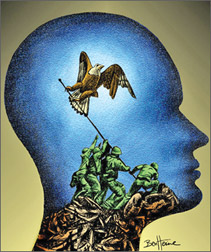
Peaceful mind |
We generally believe that wealth can give us all the happiness we
want. If one is fortunate he may become rich in various ways - inherit
wealth, win a lottery, investments may prove profitable, but usually man
struggles and toils to become rich. “Money is the sixth sense without
which you cannot make a complete use of the other five,” says Somerset
Maugham. Undoubtedly, money enables man to enjoy all the comforts and
pleasures, gives him a status in the society and the power to command.
In the process of earning we squander our youth and health. We worry
and strain to preserve what we had earned.
This wealth may be swept away in a moment by a natural cause like a
tsunami or man-made conflict. Thieves may rob. Investments may fail.
Acharya Sankara says, “To the rich, there is fear even from the son.”
Wealth may come and go. It is an illusion to think the happiness it
gives will last for ever.
We also have the notion that position and power can give us
happiness. Heavy lies the head that wears the crown. History has seen
Empires rise and fall. Individual rulers like Hitler wielding enormous
powers have met with tragedy in the end. We aspire and work hard to rise
in position and power. Alas! the enjoyment is short-lived.
When young, we take pride in our personality. We are energetic and
full of vigour and enthusiasm. Our actions are motivated by our desires
to seek sensuous pleasures and happiness. Our success and achievements
give us joy, but this is not permanent, too.
Time destroys everything - wealth, manpower and youth. Changes are
inevitable. Everything around us changes. Every stage in the life of a
man is a change, but the true nature of man does not change. Our Vedic
Scriptures emphasise the fact that man’s true nature is Bliss. We are
unhappy because of our outlook.
A change is needed in our thinking. The Life Force we perceive within
us and in every living being is the manifestation of God. It is the
Self. It is real.
The world is unreal. Pujya Gurudev, Swami Chinmayananda awakens us by
his saying “If we accept the world as a mere appearance, we could enjoy
it like a movie or drama; we may laugh or cry, but we would not accept
it as real.
Remaining seated in the truth, watch the drama of life. Be free.”
Being aware of this Knowledge, man will seek happiness within him and
not elsewhere.
A peaceful mind is a significant condition to happiness. Never brood
over the past and never worry about things yet to happen. Let us live in
the present and face life with a tranquil mind.
Om Shanthi! Shanthi! Shanthi!
How I Understand Hinduism
K S Sivakumaran
|
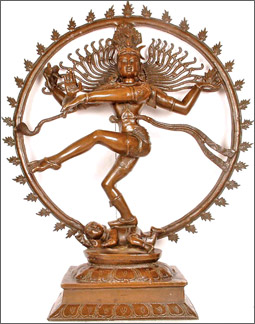
Beautiful dancing -Shiva Nataraj
|
Hinduism, as we know is one of the oldest and great religions of the
world. The Thamil film lyricist and an outstanding poet in the past
century wrote a book in Thamil called Athamulla Inthu Matham, a great
work I admire. Great people and scholars have written about Hinduism in
many languages, including English.
However as a humble seeker of truth, I venture to express my feelings
and understanding of my religion - Hinduism (basically Saivaism)
We know that the Metaphysical philosophy from the time of Rig Veda to
the present day had always two sections: One claiming spiritual and the
other physical (origin for all phenomena)
If we flash our thoughts into the distant past and trace the
development of the Hindu religion, stripping off the ideas of revelation
and rituals from it, we cannot fail to see that all conceivable ideas on
the subject from the most crude ones to the finest have been applied,
tested, and rejected: Atomism, Materialism, Spiritualism, Evolution,
Involution, Ritualism had all their impact. So much so that it is almost
impossible to think anything new which had not been thought of earlier
practised and rejected after trial.
In fact all the ‘isms’ of the present day are mere modifications of
the past ideas, with new labels. It is perhaps for this reason that the
Vedas are called ‘eternal’. All possible human thoughts have been
recorded already. The human intellect was as piercing then, as it is
today.
Instinct, Reason, and Inspiration are all names for the same
instrument for different operations.
Human intellect, being flexible and discriminative was able to raise
its head from nature worship, ancestor worship, idol worship, Devas
worship and the like - until it recognized a primordial intelligence or
consciousness as the bed-rock on which the whole phenomena depended.
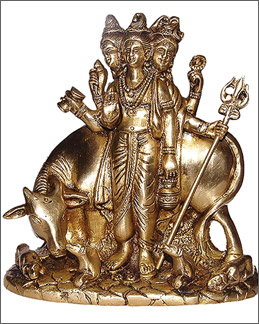
Hindu Gods |
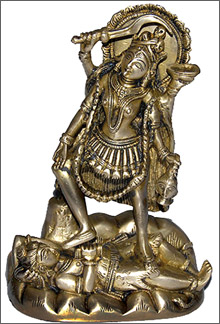
Fierce Goddess in Hinduism |
As the expanding universe was too great for humans’ investigations,
they turned the searchlight inside themselves on the premises that the
investigation of a lump of clay should be sufficient to find the
component parts of all earth.
All schools of thought in the Hindu religion accept the Vedas as
authority or revelation. The four Vedas have been strained by reason and
experience and the result is the teaching of the 108 Upanishads.
Throughout, even to an outsider who is not well versed in the
scriptures it was clear what they were hinting at. Their unanimous
verdict was “Monism -complete and pure Monism”.
There are hundreds of sects in Hinduism but everything is God is
their central conception. All phenomena originate from Him rest in Him
and emerge into Him.
If that is acceptable, and it should be acceptable, to both the
contesting parties calling themselves Idealists and Materialists for the
simple reason that Monism (complete and pure) covers both these terms.
This is the verdict of Hinduism.
The Vedas teachings, our reason and our own experience are the means
of ascertaining truth. (Suruthi, Yukthi and Anubavam)
[email protected] |



